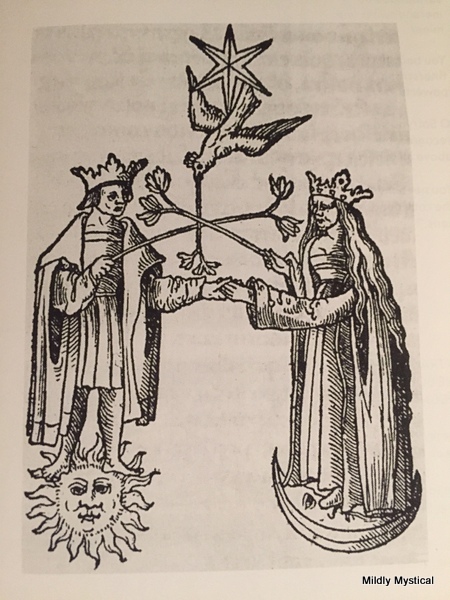I’m still humming with the energy of a recent conference entitled Losing Myth: The Price of Losing Feminine Wisdom, hosted by Christ Church Cathedral in downtown Lexington. Joyce Rockwood Hudson and the Rt. Rev. Larry Maze spoke about the vital role of personal and collective myth—eternal truths expressed in symbolic language—in helping us gain perspective on the events of our lives. They also pointed out the urgent need for integrating the feminine with our culture’s primarily masculine perspective in order to find health, meaning, and balance in our world and in our individual lives. I see the church-sponsored discussion of integrating the feminine within the church as sign of life and health, often overlooked in popular media.

Sol and Luna, from the Rosarium philosophorum, reproduced in The Hermetic Museum: Alchemy & Mysticism by Alexander Roob; 2014, Taschen.
What does it mean to integrate masculine and feminine? It’s not as simple as having equal numbers of men and women at the table, because it’s not simply a matter of gender. All of us, men and women, can exhibit characteristics understood as “masculine” or “feminine.” To be receptive is a feminine quality, but not a quality that belongs only to women. To take action is a masculine quality, but not one exhibited only by men. The inner work of self-awareness and spiritual life is feminine; the outer work of problem-solving and attaining goals is masculine. A mature man or woman draws on both masculine and feminine traits. We need both to understand when to be open to a new idea, and when to act on what we know.
Perhaps a clearer way of delineating masculine and feminine aspects is through the Chinese terms yin and yang. Yin energy is hidden from view, as when new life is gestating before being born into the world. It is connected to what is mysterious. It has to do with relationships, intuition, creativity, connection to the natural world, including the body, and with inner growth. Yin is the characteristic of night, the moon, the unconscious, and the sorting out that occurs in darkness. Yang energy is outer-directed and goal-oriented. It is analytical, decisive, and articulate. Yang orientation claims an ideal and works to achieve it. Yang is the quality of day, consciousness, and the sun. It is the light of reason, and clarity of thought. Wholeness comes through integrating the inner wisdom of yin, or feminine, energy and the outer action of yang, or masculine, energy.
We live in a culture that easily recognizes the value of a yang orientation, and tends to be more dismissive, if not downright suspicious, of yin. A patriarchal culture means not just that men are in charge, but that a masculine orientation edges out an appreciation of the feminine. Women can be just as patriarchal as men in their orientation and values. The remedy is not to denigrate the masculine in favor of the feminine, but to create balance between the two. We need both creativity and productivity, clear thought and intuitive perception, problem-solving and relationship-building.
Joyce Rockwood Hudson and Larry Maze spoke of how the church, not unlike Western culture at large, has done a great job of teaching about the masculine aspect of God, but has lost touch with God’s feminine side. Likewise the culture teaches us as individuals to measure our worth in terms of outer accomplishments and measurable achievements, ignoring for the most part our inner life.
But it is the still, small voice within that tells us which actions hold meaning. We need the guidance of inner wisdom to be fully alive. The feminine side of God gives us that, and we need her.

Comment